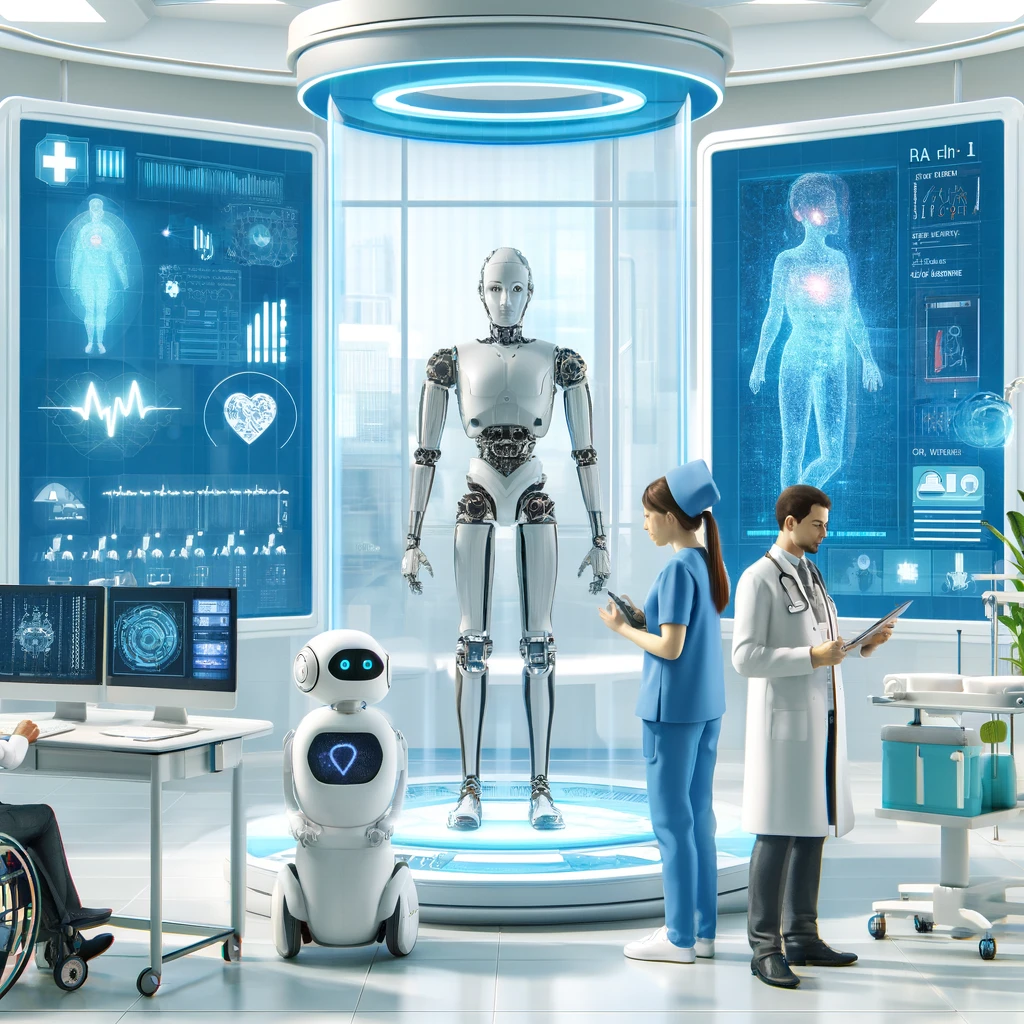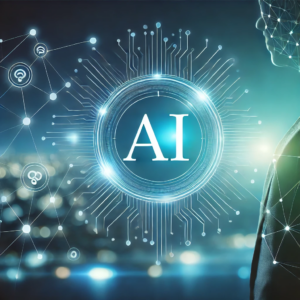

Introduction
Artificial Intelligence (AI) is rapidly transforming various industries, and healthcare is no exception. The integration of AI into healthcare systems is revolutionizing the way diagnoses are made and treatments are administered. This technological advancement is not only enhancing the accuracy and efficiency of medical practices but also paving the way for innovative solutions that were once considered science fiction. In this comprehensive article, we will delve into the various aspects of AI in healthcare, exploring how it is revolutionizing diagnosis and treatment, and what the future holds for this dynamic intersection of technology and medicine.
The Role of AI in Healthcare
Understanding AI in Healthcare
Artificial Intelligence refers to the simulation of human intelligence in machines that are programmed to think and learn like humans. In healthcare, AI involves the use of complex algorithms and software to analyze, interpret, and respond to medical data. This includes machine learning (ML), natural language processing (NLP), and deep learning, among other technologies.
Historical Context and Evolution
The journey of AI in healthcare began decades ago with basic computer-aided systems designed to support clinical decision-making. Over time, with advancements in computing power and data availability, AI has evolved to include sophisticated systems capable of performing complex tasks such as image recognition, predictive analytics, and personalized medicine.
Current State of AI in Healthcare
Today, AI is embedded in various facets of healthcare, from administrative processes to clinical applications. AI-powered tools assist in patient monitoring, diagnostic imaging, robotic surgery, and drug discovery, among other areas. These innovations are transforming healthcare delivery, making it more efficient, accurate, and personalized.
AI in Diagnosis
AI in Medical Imaging
Medical imaging is one of the most prominent areas where AI has made significant strides. AI algorithms can analyze medical images with high precision, detecting abnormalities such as tumors, fractures, and infections that might be missed by the human eye.
Benefits of AI in Medical Imaging
- Accuracy and Speed: AI systems can process large volumes of images quickly and accurately, reducing the time required for diagnosis.
- Early Detection: AI can identify subtle changes in imaging data, facilitating early detection of diseases like cancer.
- Reduced Human Error: By providing a second opinion, AI helps reduce diagnostic errors, improving patient outcomes.
AI in Pathology
Pathology involves the study of disease through the examination of tissues, cells, and organs. AI enhances pathology by automating the analysis of pathological data, leading to faster and more accurate diagnoses.
Applications of AI in Pathology
- Digital Pathology: AI algorithms can analyze digital slides to identify patterns and abnormalities, aiding pathologists in making precise diagnoses.
- Predictive Analytics: AI can predict disease progression based on pathological data, allowing for personalized treatment plans.
AI in Genomics
Genomics is the study of an organism’s complete set of DNA, including all of its genes. AI is revolutionizing genomics by enabling the analysis of vast genomic datasets, uncovering insights into the genetic basis of diseases.
Impact of AI on Genomics
- Personalized Medicine: AI can identify genetic mutations linked to specific diseases, enabling the development of personalized treatment plans.
- Drug Development: AI accelerates the identification of potential drug targets by analyzing genomic data.
AI in Treatment
AI-Powered Robotic Surgery
Robotic surgery is a minimally invasive procedure that uses robotic systems to perform surgical tasks. AI enhances robotic surgery by providing real-time data and precision control.
Advantages of AI in Robotic Surgery
- Precision: AI algorithms guide robotic instruments with high accuracy, reducing the risk of surgical errors.
- Reduced Recovery Time: Minimally invasive procedures lead to shorter hospital stays and faster recovery.
- Enhanced Training: AI-driven simulations provide surgeons with realistic training scenarios.
AI in Drug Discovery and Development
The traditional drug discovery process is time-consuming and costly. AI streamlines this process by predicting how different compounds will interact with target proteins, accelerating the identification of potential drugs.
How AI is Transforming Drug Discovery
- Speed and Efficiency: AI models can analyze vast datasets to identify promising drug candidates quickly.
- Cost Reduction: By reducing the time and resources needed for drug development, AI lowers the overall cost of bringing new drugs to market.
- Precision Medicine: AI helps develop drugs tailored to individual genetic profiles, improving treatment efficacy.
AI in Personalized Treatment Plans
Personalized medicine tailors medical treatment to the individual characteristics of each patient. AI plays a crucial role in analyzing patient data to create customized treatment plans.
Benefits of Personalized Treatment with AI
- Improved Outcomes: Personalized treatment plans are more effective, leading to better patient outcomes.
- Reduced Side Effects: By targeting treatments to specific patient profiles, AI minimizes adverse reactions.
- Predictive Insights: AI provides predictive insights into disease progression and treatment responses, allowing for proactive care.
AI in Patient Care and Management
AI in Patient Monitoring
AI-powered monitoring systems continuously track patient vital signs and alert healthcare providers to any anomalies, enabling timely interventions.
Applications of AI in Patient Monitoring
- Remote Monitoring: AI systems enable remote monitoring of patients, reducing the need for hospital visits.
- Chronic Disease Management: AI helps manage chronic conditions by monitoring patient data and providing real-time feedback.
AI in Telemedicine
Telemedicine uses technology to provide remote healthcare services. AI enhances telemedicine by enabling virtual consultations and remote diagnostics.
Impact of AI on Telemedicine
- Accessibility: AI-driven telemedicine increases access to healthcare services, especially in remote areas.
- Efficiency: AI streamlines administrative tasks, allowing healthcare providers to focus more on patient care.
- Patient Engagement: AI-powered chatbots and virtual assistants engage patients and provide them with timely information.
AI in Healthcare Administration
AI optimizes healthcare administration by automating routine tasks, reducing administrative burden, and improving efficiency.
Administrative Applications of AI
- Scheduling and Appointments: AI systems manage scheduling and appointment bookings, reducing wait times and no-shows.
- Billing and Coding: AI automates medical billing and coding, minimizing errors and ensuring accurate reimbursements.
- Resource Management: AI helps manage healthcare resources, ensuring optimal allocation of staff, equipment, and facilities.
Ethical Considerations and Challenges
Ethical Implications of AI in Healthcare
The integration of AI into healthcare raises several ethical issues, including data privacy, consent, and the potential for bias in AI algorithms.
Key Ethical Concerns
- Data Privacy: Ensuring the privacy and security of patient data is paramount.
- Informed Consent: Patients must be informed about the use of AI in their care and provide consent.
- Algorithmic Bias: AI systems must be designed to avoid biases that could lead to disparities in healthcare.
Regulatory and Legal Challenges
The use of AI in healthcare is subject to regulatory and legal scrutiny. Ensuring compliance with healthcare regulations and addressing legal challenges is crucial for the successful integration of AI.
Regulatory Considerations
- Compliance: AI systems must comply with healthcare regulations such as HIPAA in the US.
- Safety and Efficacy: AI-driven medical devices and applications must demonstrate safety and efficacy through rigorous testing and validation.
- Liability: Determining liability in cases of AI-related errors or adverse outcomes is a significant legal challenge.
Technical Challenges
Despite the potential benefits, the integration of AI into healthcare faces several technical challenges, including data integration, interoperability, and the need for robust infrastructure.
Overcoming Technical Barriers
- Data Integration: Ensuring seamless integration of AI systems with existing healthcare infrastructure.
- Interoperability: Developing standards for interoperability to enable data exchange between different AI systems.
- Infrastructure: Investing in the necessary infrastructure to support AI technologies, including high-performance computing and data storage.
Future of AI in Healthcare
Emerging Trends and Innovations
The future of AI in healthcare looks promising, with several emerging trends and innovations poised to transform the industry.
Key Trends to Watch
- AI in Mental Health: AI is being used to develop tools for mental health diagnosis and treatment, including virtual therapists and mood tracking apps.
- Wearable AI: Wearable devices with AI capabilities are revolutionizing patient monitoring and preventive care.
- AI in Public Health: AI is playing a crucial role in public health initiatives, including disease surveillance and outbreak prediction.
AI and the Future of Medical Practice
As AI continues to evolve, it will become an integral part of medical practice, enhancing the capabilities of healthcare providers and improving patient care.
Potential Impact on Medical Practice
- Enhanced Decision-Making: AI will support healthcare providers in making more informed and accurate decisions.
- Increased Efficiency: AI will streamline medical workflows, reducing administrative burden and allowing providers to focus on patient care.
- Improved Patient Outcomes: The integration of AI into healthcare will lead to better patient outcomes through personalized treatment and early intervention.
Preparing for the AI-Driven Future
Healthcare organizations must prepare for the AI-driven future by investing in technology, training, and infrastructure to harness the full potential of AI.
Steps for Successful Integration
- Investment in Technology: Investing in advanced AI technologies and infrastructure is essential for successful integration.
- Training and Education: Providing healthcare professionals with training and education on AI technologies.
- Collaboration and Partnerships: Collaborating with technology companies, research institutions, and other stakeholders to drive innovation and adoption of AI in healthcare.
FAQs
What is AI in healthcare? AI in healthcare refers to the use of artificial intelligence technologies to analyze medical data, enhance diagnostics, personalize treatment, and improve patient care. It encompasses a range of applications, including medical imaging, pathology, genomics, robotic surgery, and patient monitoring.
How does AI improve diagnosis? AI improves diagnosis by analyzing medical data with high precision and speed. It can detect abnormalities in medical images, analyze pathological data, and identify genetic mutations linked to diseases, leading to earlier and more accurate diagnoses.
What are the benefits of AI in treatment? AI enhances treatment by enabling personalized medicine, improving surgical precision, and accelerating drug discovery. AI-driven tools can create customized treatment plans based on individual patient data, reduce surgical errors, and identify potential drug candidates more efficiently.
What ethical considerations are associated with AI in healthcare? Ethical considerations include data privacy, informed consent, and algorithmic bias. Ensuring the security of patient data, obtaining patient consent for AI use, and designing unbiased AI systems are critical to addressing these concerns.
What challenges does AI face in healthcare? Challenges include regulatory compliance, technical barriers such as data integration and interoperability, and addressing ethical issues. Overcoming these challenges requires investment in infrastructure, adherence to regulations, and collaboration among stakeholders.
What is the future of AI in healthcare? The future of AI in healthcare includes emerging trends like AI in mental health, wearable AI devices, and AI in public health. AI will continue to enhance medical practice by improving decision-making, increasing efficiency, and enhancing patient outcomes.
Conclusion
AI is undeniably revolutionizing healthcare by transforming diagnosis and treatment. From enhancing medical imaging and pathology to enabling personalized treatment plans and robotic surgery, AI is making healthcare more accurate, efficient, and patient-centric. While there are challenges to overcome, the potential benefits of AI in healthcare are immense. As technology continues to advance, the integration of AI into healthcare will undoubtedly lead to improved patient outcomes and a more efficient healthcare system.





